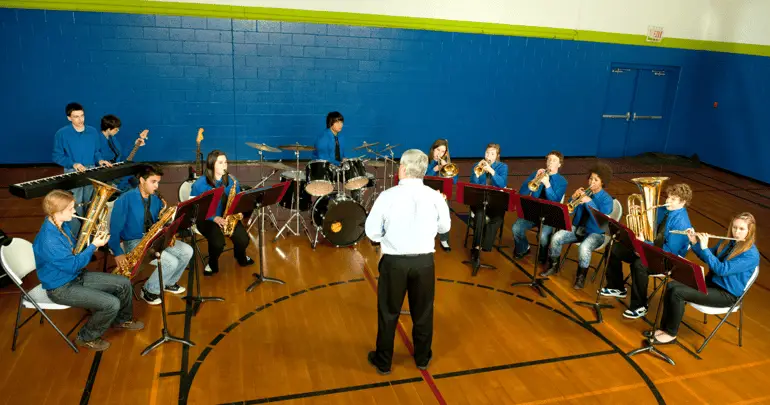GETTING PROPERLY ENGAGED (WITH EXTRACURRICULARS)

There is a lot of pressure for students to do extracurricular activities. Many colleges view EC’s as a critical element of the application. There are varying degrees of a student’s engagement level: Is the student doing enough in this regard? Are they following their passions? Or are they doing the activity because they were told to?
I pose the following critical question to get to the core: Who owns the extracurricular activity?
It sounds like a crazy question…shouldn’t the answer be “Of course, the student owns it?”
But, consider the possibility that the parent owns the activity:
The image of a parent working on their elementary or middle school students school project is something many of us can relate to. To the parents, they may remember their own experience gaining assistance on building a volcano that used some type of baking soda to erupt or a 3D view of a scene from history—maybe something like George Washington crossing the Delaware River in a boat. Once the student is in high school, the academic grades become even more important—especially for college admission—and extracurricular activities compete for the student’s available time. It becomes tempting for some to take “shortcuts”. This may be simply a parent wanting to stem the tide of tears when a complex high school assignment is behind schedule and the student struggles to complete it in time. Time for Super Mom or Super Dad to step in and save the day!
From a practical matter, is the student the one asking how they can help volunteer for a community service organization, or is the parent the one that sets up the activity? Although most parents would say that “helping” their son or daughter is their only option, this support may include some long-term harm. What will happen when their kid is in college and the parent can no longer “own” or get involved with the activity?

Certainly, another answer can be that the student owns the activity and has a balanced and manageable extracurricular portfolio :
In this scenario, the student is blessed with curiosity, dedication and a long-term view—basically, the ideal situation.
But maybe there is some gray area—not as positive as the student ownership scenario described above and not as potentially negative if someone else owns the activity.
What if the student owns just one activity?
Like the curiosity and dedication elements, so important to academic and career growth, this student is usually envied for their focus. When compared to other selective college candidates, however, there is a risk that a singular focus may not be viewed as competitive by the admission application readers. One might conclude that the student didn’t take the risk of trying something else or something new.
What if the student now passively owns these or more activities, whereas they had previously been fully invested? What if they are not as fully engaged as before?
They may have been doing this activity for a very long time and the activity community may assume that the student will continue this activity well into the future. Over time, the student may become bored and drift towards other interests. Often, a student has been going through the motions for so long, they don’t know how to get off the merry-go-round. So, just at the time that they want to highlight their activity to improve their admission chances, it may be in a visible decline. They might be better off finding an interest that would carry with them for the coming years and beyond.
But if a student doesn’t even start an activity, there is no chance of personal ownership. What if the student has no interest in owning any activity?
Many would view this as a sad state. It doesn’t address how well this student is doing from an academic perspective, but it is sad as the student isn’t as fully actualized outside of the classroom. And I would argue that the wealth of his experiences may not be as developed. From the college application perspective, the student may view their only option is to fabricate or embellish some activities OR be genuine and acknowledge that there is little or nothing to describe. If the fabrication sounds too good to be true, it will likely hurt the student’s chances of acceptance. Similarly, without any activities, the student is statistically less likely to be accepted.
As you step through the above scenarios, you might view the benefits of being involved in activities.
An analogy that one of my peers shared when discussing the relationship that students have with activities was that of cars:

A student can either be in the car as a driver, a passenger or not be in the car at all.
The Driver is active, involved, and comfortable in the driver’s seat and is the first to see the path ahead and plans to get to their destination.
The Passenger is passive, letting someone else get involved. They will have to depend on the driver to get them to the destination and may not even have a say into where or what the destination is, never mind the route taken to get there. The hope is that by watching the driver, they may be able to take over the driving responsibilities in the future.
But the one that never gets in the car cannot travel anywhere.
If you have a student that is already a “driver,” you might want to leave what is working alone.
For the student that has been uber active with a certain extracurricular, but is becoming less engaged over time, this is a warning sign. They already know how to be active, the question is whether their intense involvement with one activity is best for them as they grow and evolve. Would they be better off using their valuable time for something else? At the very least, it is worth a conversation.
The most concerning is the student that never starts. He or she may have a variety of great reasons to not take on any extracurricular activities. Often students offer up that they didn’t sign up at the start of the school year, and can’t start now. For athletics this might be more true than other activities, but for the great majority of other activities, it is more of an excuse. Try to walk back the excuses that are offered and probe for the real reason for non-engagement. Are they just afraid? Is there someone involved in the organization that they don’t get along with? Try to get to the core of what is stopping them and attempt to discuss that. There is no script to follow. Sometimes a little “nudge” might be enough. The key is to describe how this involvement will benefit them.
Extracurricular activities, when balanced and fitting to a student’s interests can be life changing. Often it is a way to develop their skills, personalities, and confidence.
So, when you see a student that is fully, partially or not engaged, I hope you will see the impact of each of these as a choice. The goal is to assess what they are doing and continue to explore possible activities outside of their safe zone.
We can help support you through this anxious and critical time with our academic tutoring, test prep, college selection, total application support and college decision making expertise. Give us a call today. 914-273-2353
Best Regards,

Neal Schwartz, Owner
College Planning of Westchester
[email protected]
914-273-2353 (office)
914-500-5899 (mobile/text)
NOW IN OUR 19TH YEAR

NOW REGISTERING FOR OUR:
COLLEGE COUNSELING PROGRAM AND SAT/ACT TEST PREP PROGRAMS
NOW IS THE BEST TIME FOR TEST PREP AND COLLEGE APPLICATIONS
Register Today








